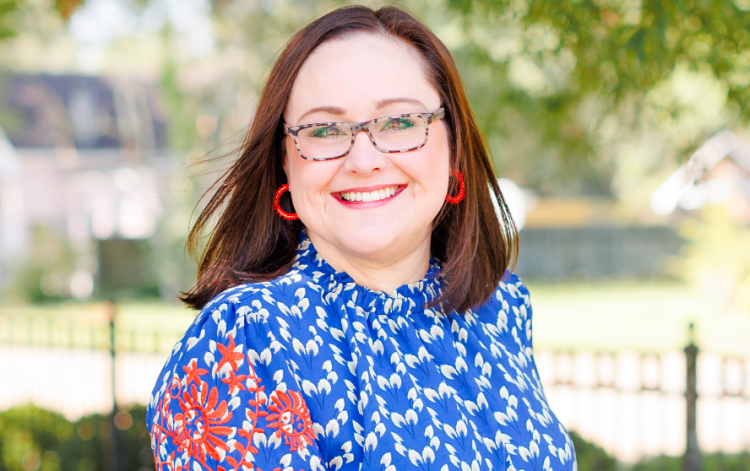Celebrating the Freedom to Read During Banned Books Week With 'That Librarian'

This article first appeared in the September issue of Kansas City Magazine.
In recognition of Banned Books Week, September 22-28, the Library hosts two guest speakers: Margaret Atwood – author of dozens of books, including The Handmaid’s Tale – on September 24, and That Librarian author Amanda Jones on September 25.
The American Library Association’s Office for Intellectual Freedom documented 1,247 demands to censor library books and resources in 2023. The number of titles targeted for censorship surged 65% in 2023: 4,240 unique book titles were targeted for removal from schools and libraries.
Jones, a Louisiana school librarian, has faced these attacks head-on. After giving what she calls a “blanket speech about censorship” at a library board meeting in July 2022, members of a right-wing censorship organization in the audience launched a social media smear campaign against her. She filed a defamation lawsuit and continues to speak out against book banning attempts. Ahead of her appearance at the Library, Jones discussed her concerns and observations:
We’ve seen book challenges and censoring in Missouri also. After dealing with these censorship groups up close, what do you understand about their motivation?
Overall, it’s political pandering. It’s politicians coming in with fake controversies so that they can have a platform of saying they’re going to save the children, and they’re going to fix these problems that don’t exist. It all boils down to the basic trend of what you see in stuff like Project 2025, that they’re trying to defund public libraries and public schools. So, they start with the books, and then they rile up the community with the books and then they move on to other things.
Why is it so important not to ignore the attacks?
As an educator, I teach kids what to do if they’re bullied online. And I teach them to report it and the steps to take and not to argue back on social media, but to report it and do something about it, because they don’t deserve to be treated that way; they deserve to protect themselves. I figured I’d be a big hypocrite if I didn’t do the same thing. But also, I mean, I’ve had a lot of former students who’ve taken their own lives that are members of the LGBTQIA+ community – or were. And they were led to feel ostracized and othered in my community, and I’m just tired of it. I have a platform, and I have privilege. Author Samir Ahmed said it best when she said we should use our power and privilege for purpose.
Why is it important to have many, many identities represented in books?
I love the quote by Dr. Rudine Sims Bishop that books are windows and mirrors and sliding glass doors. Libraries are for everyone. And every person in the community pays taxes, whether it’s property or sales, or whatever. And everyone is a member of that community, and they deserve to be represented in the books on the shelves and through the characters and authors in all the books.
A lot of times these people that post the notion of pornography in the library are labeling LGBTQIA+ books as pornography even when they have zero sexual content in them whatsoever. The book Pride Puppy! has had banning attempts here, and there’s a book now called I’m Not a Girl that has zero sexual content in it whatsoever, but people will say it’s sexually explicit when it’s not.
What was the effect of finding yourself in books? How did that make you feel as a child when you could pick up a book and think here I am.
In Otherwise Known as Sheila the Great, Sheila was so bossy. And I was like, oh, I am really like that. I read that in probably second or third grade. And so if I’m able to see that and learn a life lesson in second or third grade by reading a Judy Blume book, imagine what we can learn over the course of our whole lives by reading other books. Yeah, I saw that I was bossy, and I learned about bullying when I read Blubber and about antisemitism when I read Starring Sally J. Freedman as Herself. You can learn what other characters experience and how they react (to adversity). And we can decide, well, that’s a great way to react. Or maybe, if I’m faced with that, I should not react like that. It puts you in scenarios that maybe you have or have not experienced and are able to learn some lessons from it and grow as a person.
Margaret Atwood also does so much with speaking out about book challenges and human rights issues and will be at the Library the day before you are.
What’s your take on appearing right after her?
It’s so ironic that she’s going to be there they day before me because I tell people all the time, I feel like I’m living in The Handmaid’s Tale. I feel like if we’re not careful… Women are seeing all of our rights being taken away. Book banning, they’re not necessarily taking women’s rights, but they want to take LGBTQIA+ communities’ rights away and our BIPOC communities’ rights. It’s the same people and the same organizations that push for book banning that are also against women’s rights. They’re against abortion. They’re against birth control. It’s the same thing. It’s the same world. I think if more people read The Handmaid’s Tale, more people would be against book banning.
RSVP for the September 25 Amanda Jones event.
The Margaret Atwood event is at capacity.